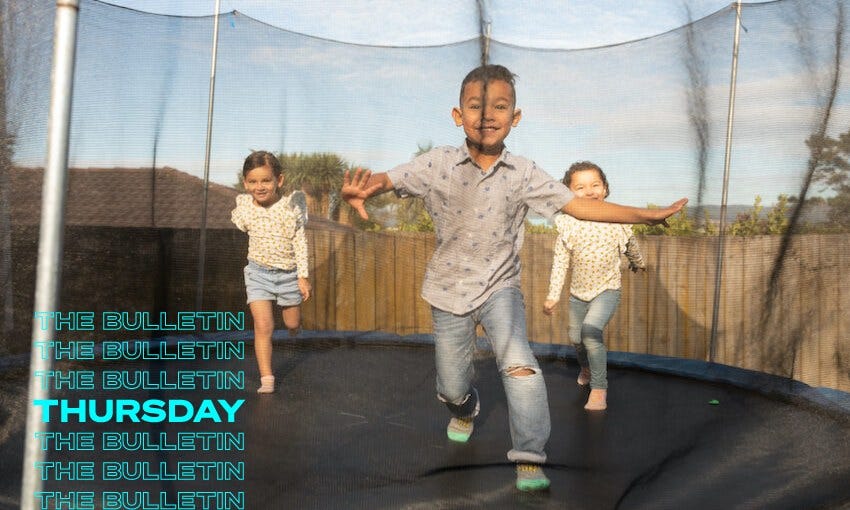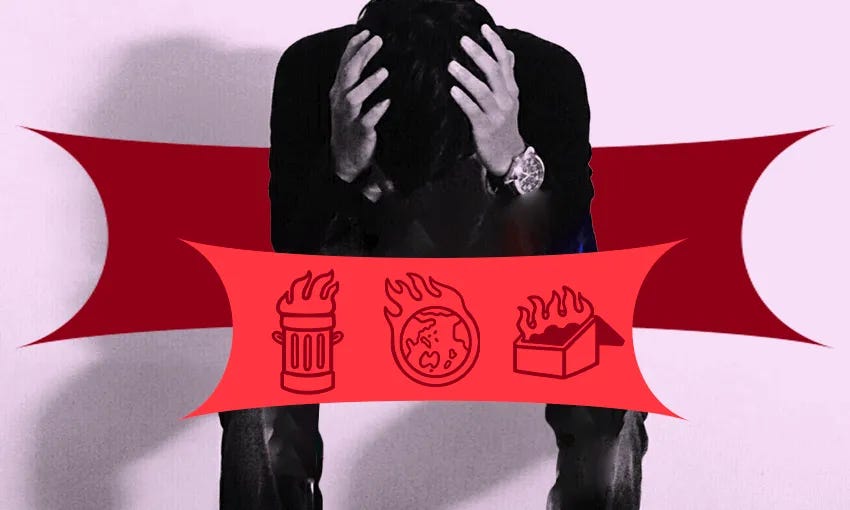The state of children’s health in New Zealand
A new report finds rates of four health conditions in children remain too high compared to rest of developed world
Mōrena and welcome to The Bulletin for Thursday, June 23, by Anna Rawhiti-Connell. Presented in partnership with Z Energy.
In today’s edition: the nixed plan to give Aucklanders $100 last year; BusinessNZ tries new approach in opposition to Fair Pay Bill; the worst time to be a first home buyer; but first, a new report on the state of children’s health.
A new report from Cure Kids was released yesterday on the state of children’s health (Photo: Getty Images)
New Cure Kids report puts inequity front and centre of children’s health
I have a regular conversation with a group of friends who grew up in the 80s and 90s. We all came from a real mix of socio-economic backgrounds but feel like we had similar experiences of childhood. We were nerds who thought a treat was going to the library on Friday nights. We got a packet of felts for our birthday. We remember the dental nurse and having similar childhood ailments. It’s all a bit rose-tinted but I often think about these conversations when new evidence is presented about how different outcomes are for kids now, based on socio-economic factors. A report released yesterday from Cure Kids highlights just how badly deprivation is affecting the state of children’s health in New Zealand.
New Zealand “one of the worst places in the developed world to be a child”
The report’s topline is that the rates of the four diseases they benchmarked in children are too high relative to other resource-rich countries. The report looked at dental health, respiratory illnesses, skin infections and rheumatic fever. Paediatrician Stuart Dalziel said the report highlights the inexcusable inequity that exists in our health outcomes for children. Children’s Commissioner Frances Eivers did not mince words in the report’s foreword, saying “On many measures, New Zealand is currently one of the worst places in the developed world to be a child.”
Rheumatic fever disproportionately affecting Pacific and Māori children
Respiratory conditions like asthma are the leading cause of acute admissions to hospital for children in New Zealand. Rheumatic fever, an illness caused by a strep infection that results in heart damage, disproportionately impacts Māori and Pacific children. It’s an illness that’s been called “a national shame”. During the 2020 election campaign, prime minister Jacinda Ardern said we shouldn’t have it in New Zealand. Recurrent strep infections are connected to poor housing conditions. The report found Pacific children were admitted to hospital for rheumatic fever 140 times more often than children of “European or Other” ethnicities. Māori children were admitted to hospital for rheumatic fever 50 times more often.
Tooth decay in children brings sugar consumption to the fore
The report also found 41% of five-year-olds had signs of tooth decay while the rate of hospitalisations for children with serious dental decay had steadily increased since 2000. Tooth decay in young children is caused by frequent consumption of sugary drinks and foods and by insufficient oral hygiene. A petition was presented yesterday at parliament calling for all schools in New Zealand to be sugary-drink free. The question of a sugar tax cropped up again earlier this month. Rob Beaglehole from the NZ Dental Association argues we need to be proactive with a sugar reduction strategy because of the woeful state of water fluoridation in New Zealand. The New Zealand Initiative’s Eric Crampton says the evidence doesn’t support the argument that a tax would reduce consumption.
A vital message from The Spinoff’s publisher, Duncan Greive:
If you’re reading this, you’re hopefully getting value out of The Spinoff. Yet like many publishers, The Spinoff has suffered a significant drop in members, despite our costs continuing to increase. On one level I understand why our membership has dropped away. There’s a cost of living crisis, and inflation has made life hard for many of us. It’s totally normal to feel like you don’t need to support your local media organisation at a time like this.
The promise we’re making to you is that we’re actually better-suited to times like this than the pandemic itself. Our plan is to return to something more of what made us – coverage of culture, politics, te ao Māori and more with heart and humour. We will do that with features, essays and opinion pieces, but also podcasts, comics, video and newsletters. We are here to help walk you through this fascinating new era, and feel well-suited to being your guide.
But we can’t do it without you. The Spinoff has been cut out of the government’s enormous $100m plus Covid-19 campaign, which has been a boon to the big media companies and social media platforms. We returned the wage subsidy, unlike almost every other media organisation. The public interest journalism fund was narrowly targeted and is winding down. The big tech companies are refusing to do what they did in Australia and make meaningful deals with local media. And the recessionary drums continue to beat loudly, impacting the commercial spend we rely on, along with you, our members.
All of which is to say that we need your support more than we ever have. So please, if you can, click here to support The Spinoff by becoming a member today.
Five new Covid scenarios planned for
The ministry of health has developed five scenarios to deal with new Covid variants. Covid-19 response minister Ayesha Verrall held a briefing yesterday to outline each of them. While the scenario planning casts forward, there’s been a fair bit of casting back as we undertake scrutiny of what happened last year and how decisions were made. Chris Hipkins has admitted he released incorrect and personal information about then-pregnant journalist Charlotte Bellis and apologised. Bellis has accepted his apology. RNZ’s Katie Todd reports that the government spent $43,000 fighting another pregnancy-related MIQ case in court last year. Meanwhile Marc Daalder at Newsroom has used the Official Information Act to look at an abandoned plan to give Aucklanders $100 at the end of last year following the three and a half month long lockdown.
BusinessNZ suggests Fair Pay Bill could breach Bill of Rights
BusinessNZ CEO Kirk Hope appeared in front of the education and workforce select committee yesterday with a new approach to opposing the Fair Pay Bill. As Stuff’s Tom Pullar-Strecker reports, the lobby group has commissioned an opinion from Thorndon Chambers litigator Andrew Butler, which Hope said had concluded there were several parts of the bill that were not likely to be consistent with the Bill of Rights. The Fair Pay Bill is back at select committee where they are hearing from submitters about the proposed legislation that would introduce collective bargaining across entire industries and occupations rather than between unions and employers. Labour MP Camilla Belich also questioned Hope on the group’s claim that New Zealand had made it onto a "naughty list" at the United Nations International Labour Organisation (ILO).
The worst time in 65 years to be a first home buyer
Housing hits the print front pages of the NZ Herald, the Dominion Post and The Christchurch Press today. In the Dominion Post, Ethan Te Ora reports on house price downturns in the capital. The Press is running Liz McDonald’s story on the record number of new homes being approved for Christchurch. The Herald has new research from Infometrics that concludes right now is indeed the worst time to be a first home buyer. The worst time in 65 years in fact. Infometrics has compared the total payments made by homeowners over the lifetime of their mortgage against the value of the property when the loan has been repaid. The approach, says report author Gareth Kiernan “takes better account of total housing affordability than simple comparisons of incomes to house prices or incomes to servicing costs in the first year of borrowing”.
For what it’s worth, I am acutely aware of the stream of bad news at the moment. As I round off another item that fits that bill, I commend Duncan Grieve’s piece on the Spinoff today to you. It’s linked below.
Got some feedback about The Bulletin, or anything in the news? Get in touch with me at thebulletin@thespinoff.co.nz
Everything is getting worse and everybody feels bad. Right? Duncan Greive grapples with the reality of the "new normal". James Dann attempts to explain the Christchurch stadium omnishambles. Alex Casey meets a bereft fan of Ernest Adams slices, which have been abruptly discontinued after decades as a mainstay of New Zealand morning teas. Sam Brooks talks to Kanoa Lloyd about her new show helping families confront their clutter. And Simon Day shares some tips for how to celebrate Matariki if you don’t know where to start – for example: "don't buy presents, be present".
The roads plotted since high school
Lockerroom are running a series on athletes heading to the Birmingham Commonwealth Games, taking them back to high school to discuss how they came to find the sports they excel at. So far Suzanne McFadden has talked to weightlifter Emma McIntyre, who started as a hurdler and gymnast Havana Hopman. Today she profiles Suzie Bates, White Fern and Tall Fern and discovers Bates might have hoped to add Black Fern to the list, playing rugby at high school. Her rugby career ended prematurely when she broke her collarbone – playing basketball.
Mānawatia a Matariki
Tomorrow we mark our first ever public holiday for Matariki. It does feel like a seachange for our country in recognising the significance of mātauranga Māori to our national identity. A 2012 essay from Sir Hirini Moko Mead on mātauranga Māori, published on E-Tangata this week, remains ever-prescient and is my recommended read today.
There’s also a wonderful collection of writing about Matariki on The Spinoff, includingAlice Webb-Liddall’s profile of the “humble superstar” of Matariki, Rangi Mātāmua. In Simon Day's piece (linked above) on how to celebrate and recognise Matariki, Mātāmua says “Celebrate how you want to celebrate. Make it your Matariki where you are”.











I love The Spinoff
Its sassy and smart and gives an alternative view to the mainstream.
I have quickly read through this issue and with all the pressure everywhere on everyone I have to wonder why are the big five banks left to cash their big fat cheques every year regardless of the economy. Profits before people or simply we have no sway over what they can and cant charge?$5billion seems exorbitant in good years, in bad economic years its outright and unjustifiably wrong
Can The Spinoff dig into this?
Cheers for a great read
DMcLean